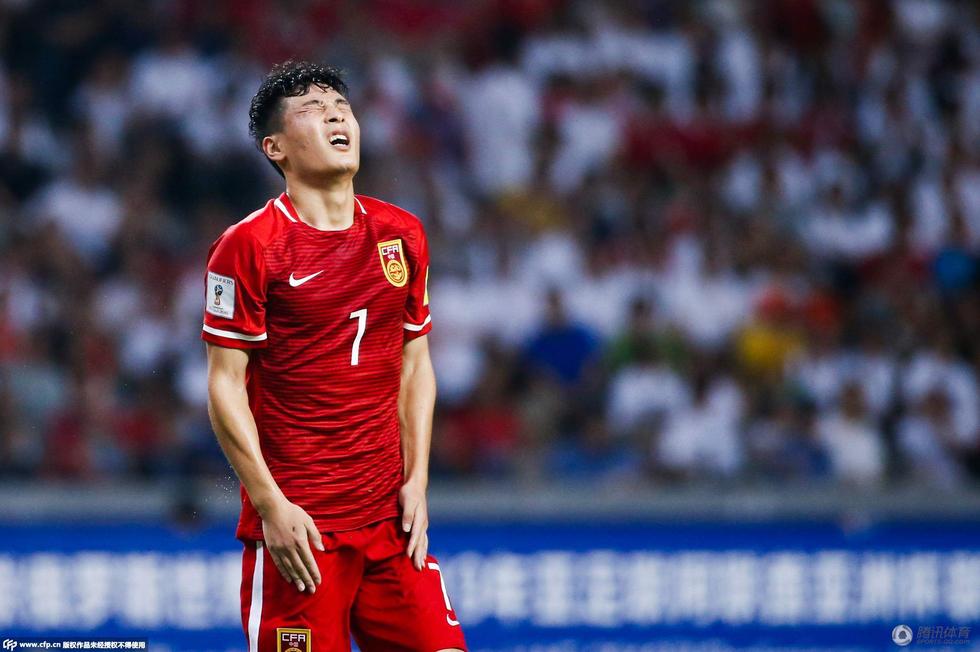With a new manager and not much hope, China are set to play their final two World Cup qualifiers over the next week. Gao Hongbo takes charge as the Chinese look for six points against the Maldives and Qatar with half an eye on events elsewhere as they try to secure a best runners-up spot. WEF tries to make sense of it all by looking at what China needs to happen across Asia, what to expect from the opposition and who is in and out of Gao’s first squad.
Mission Improbable
China approach their remaining two fixtures with nothing more than a thin veneer of hope that they can reach the final round of World Cup qualification after two 0-0 draws with Hong Kong and a defeat in Qatar. After China’s second stalemate with the Special Administrative Region in November, a hibernating CFA apparently waited two months before consulting the group tables and realising that China’s hopes of advancing to the final 12 had all but evaporated.

Alain Perrin was sacked by the CFA after almost two years in charge
For it was only in January that they took the decision to relieve Alain Perrin of his managerial duties after nearly two years in charge and they didn’t even bother to secure a successor before letting him go. There are reportedly a slew of candidates, but the decision was made to re-appoint Gao Hongbo on a temporary basis and the 50-year-old, who was fired as China boss in 2011, will take charge of these final two qualifying matches against the Maldives and Qatar.
For Gao the brief is simple, take six points and hope for the best. China currently lie third in the group, but they are three points behind Hong Kong with a game against the Maldives in hand. Few doubt that China will climb above the impudent SAR in the table, but the problem is that they then also have to finish as one of the four best runners-up in a field of eight.
In order to construct a definitive mathematical formula which explains China’s odds of going through, WEF contacted Stephen Hawking and those guys who built the Large Hadron Collider for help. Both found the task beyond their capabilities and so we decided to make things simpler. Not quite as simple as just saying that China are screwed (although that would probably suffice), but to look specifically at a few teams which the world’s most populous nation needs to slip up in order to have any hope of progress.
First of all, there are some scenarios that could see China advance with four points from these two games, but they are about as likely as Leicester City winning this year’s Premier League Manchester United winning this year’s Premier League and so are not worth considering. With results against the bottom teams in each group not being calculated, China would currently rank seventh among the eight second placed teams if they were actually in second.
Syria are top of the pile and can’t be caught regardless of results this round, while Jordan, who are now, somewhat surrealy, under the tutelage of Harry Redknapp, could only be caught if they fail to win a home game against Bangladesh. Meanwhile, Uzbekistan, who China defeated in last year’s Asian Cup, would have to fail to pick up a single win in two home matches against the Philippines and Bahrain.
With those three teams looking uncatchable, China would have to finish above Iraq who can guarantee a superior record by taking four points from home matches against Vietnam and Thailand. Of course, “home” matches for Iraq are always played on neutral territory, and China’s best hope is that a resurgent Thailand can defeat the Middle Eastern side. Should that happen, China would also need the United Arab Emirates to drop points in at least one of two home matches against Palestine and Saudi Arabia. Not impossible, but should the UAE take four points from those two games, they will almost certainly place above China thanks to a superior goal difference furnished by a 10-0 victory over Malaysia.
And if all of that is too straightforward for you, Kuwait, who lie in second place in Group G, are currently suspended by FIFA and so won’t play their matches in this round. If FIFA decides not to reinstate them, Lebanon are guaranteed to finish second and would need to take just two points from games against South Korea and Myanmar to finish with a better record than China given that results against the Kuwaitis would no longer be calculated.
Matters could be further complicated by a team slipping from top spot to second place, or a side climbing off the bottom of the table and changing the results that need to be calculated. But factoring in all of that is what put Hawking off and there is already plenty to chew over here.
Obviously, this all presumes that China will get six points and, once you’ve had a lie down, you can read how likely that is.
Maldives
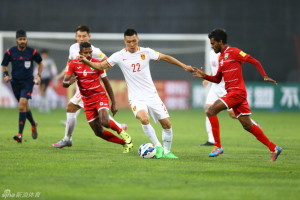
Yu Dabao scored twice the last time China met the Maldives
China’s first match is against the Maldives in Wuhan on Thursday evening and it’s a game that both sides are writing off as a home win. The “away” fixture back in September was played in Shenyang because the Maldives ground wasn’t up to FIFA standards and China triumphed with a comfortable, if uninspiring, 3-0 win thanks to a brace from Yu Dabao and a Zhang Linpeng header.
The win was a marked downgrade on the last time China faced the Maldives on home soil – a 10-1 demolition during qualification for the 2002 World Cup – but it is worth noting that the island nation with a population of just 400,000 has improved immensely over the last 10 years. Of course, they’re still expected to lose by a considerable margin and it seems like that has been acknowledged by the fact they have only brought an 18-man squad with them to China.
Indeed, the focus for Ricky Herbert’s men is actually a home tie with Bhutan five days later. Providing they avoid defeat by two goals in that match-up, the Red Snappers will not finish bottom of the group, meaning they could gain a spot in the qualifying groups for the 2019 Asian Cup (congratulations to the AFC for creating this incredibly convoluted process). Significantly, the man who guided New Zealand in the 2010 World Cup will be without several regular starters including goalkeeper Mohamed Imran and and star striker Ali Ashfaq.
There is no doubt that China will win this game and, with goal difference potentially mattering, the question is really how busy the scoreboard operators are going to be. Unfortunately for China, despite their weakened opponents, it’s about ten years too late to anticipate the double figure haul that could prove helpful.
Qatar
The real challenge to Gao’s six point quest is Qatar who China will face in Xi’an five days after taking on the Maldives. Indeed, the Maroon have a perfect six wins from six and became the first Asian side to confirm their place in the final twelve thanks to their perfect record.
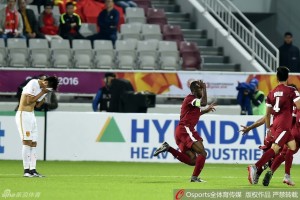
Qatar left-back Abdulkareem Hassan celebrates a goal against China as the under-23 Asian Cup
The Qataris were massively disappointing at last year’s Asian Cup, but have been impressive ever since as they look ahead to their own World Cup in 2022. Part of that impressive run was the comfortable 1-0 victory they managed against an overly conservative China last October.
Despite the fact they have nothing to play for , Uruguayan coach Daniel Carreno has named a strong squad for their two remaining qualifiers against Hong Kong and China which includes rampaging full backs Abdulkareem Hassan and Mohammed Musa. The former, who clearly has the quality and physicality to succeed somewhere in Europe, showed how dangerous he could be when he scored twice against China (including an absolute thunderbolt) in the recent under-23 Asian Championships, but he only represents the cream of an impressive crop of youngsters who have also been cutting their teeth in this qualifying campaign.
Ali Assadalla was impressive as an attacking midfielder at that under-23 competition and 19-year-old Akram Afif was a constant danger on the wing, although he may not start against China. Ghana born striker Mohammed Muntari didn’t live up to his hype in that competition, but he could still feature here.
Meanwhile, Uruguayan born veteran Sebatian Soria is also in the squad and is another attacking player China will have to be aware of. Of course, the Chinese will also know all about box-to-box midfielder Karim Boudiaf who not only put on a fine display in the middle of the park the last time these sides met, but also demonstrated the aerial prowess which WEF warned about when he headed in the winner last time out.
Objectively based on performances over the last year, it is hard to imagine China claiming the victory they need over Qatar in this match-up. However, despite Carreno stating that Qatar “will play with the…zeal and desire to win all future games” Qatar could well lack motivation after making the trip from Doha, where they will play Hong Kong on Thursday, to Xi’an.
That being said, the visitors’ full backs can be deadly and this will be a massive test with the pressure on. Unfortunately, should China achieve victory over their Middle Eastern opponents, it will be difficult to assess whether it’s because Gao has outwitted Perrin, or simply that the Qataris are unmotivated.
The Squad
A new manager often means a new beginning, but that’s only partially true in this case as Gao Hongbo named a squad with some new faces, but some pretty old ones, too. The big news when the 23-man list was revealed being the exclusion of midfielder Zheng Zhi who team captain under Perrin.
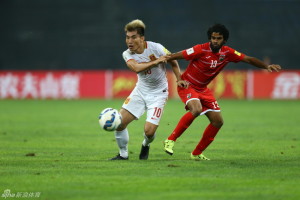
Zheng Zhi will not take on the Maldives this time around
At 35, there is no doubt that Perrin was over reliant on Zheng (even shoeing him in at centre back rather than test out younger talent at the East Asian Cup), but his absence from the squad still came as a surprise. Of course, with Zheng set to be 37 by the next World Cup, it could have been argued that Gao was making a progressive move by leaving him out, but then he recalled the 34-year-old Du Wei to replace injured Zhang Linpeng.
Du, who will probably only feature in the event of an injury, was Gao’s captain at the 2011 Asian Cup but hasn’t been capped since 2013 and, more importantly, hasn’t started a Super League game since May 2014. After leaving Shandong Luneng, Du spent 2015 with League One promotion winners Hebei CFFC where, despite getting plenty of attention because of his reputation, he didn’t perform exceptionally well. In Hebei’s only Super League game this season, Du was left on the bench in favour of under-23 international Jin Yangyang who, despite failing to cover himself in glory during the recent under-23 Asian Championships, would surely benefit more than Du from being involved in the national team set-up.
In a less surprising move, Gao has also recalled Gao Lin to the squad after the Guangzhou Evergrande attacker had been ostracised by the previous manager and he has also confirmed that Perrin’s on-again-off again centre back interest Feng Xiaoting is firmly back in place. Some other moves which suggest Gao is keen to restore some of his old squad are the recalls of Hao Junmin, Li Xuepeng and Jiang Ning.
Hao Junmin’s reinvention as a Pirloesque (relatively speaking, of course) deep lying play maker who can still do damage if played on the flanks perhaps justifies his return, while Jiang Ning’s comeback has raised question marks. Jiang hasn’t been included in a China squad since 2013 and, while he put in some solid performances in Guangzhou R&F’s successful 2014 season, he spent a lot of last year shunted out at right-back and has yet to establish himself at new club Hebei CFFC.
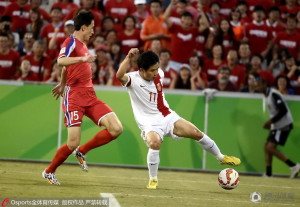
Hao Junmin is one of several players recalled by Gao
Given Zou Zheng’s terrible injury and Jiang Zhipeng’s lack of form, recalling Li Xuepeng to play left-back does make sense even if the Guangzhou Evergrande player is yet to really impress domestically over the last two years. Of course, when discussing the defence it’s important to acknowledge that Gao has also given some new blood a chance by calling up Ding Haifeng, Zhao Mingjian, Wang Shenchao and Li Ang.
Of the four, only 23-year-old center back Li, who came into the Jiangsu first team under Gao, has been capped. With Zhang Lingpeng out injured, Shandong Luneng’s Zhao Mingjian will compete with Zhang Chendong for the right back spot, while the versatile Wang can provide cover in positions all across the defence. Ding Haifeng, who we predicted would receive a national team call-up this year when we reported on his transfer from Liaoning Whowin to Hebei CFFC, will compete with Li Xuepeng at left back where he offers a more attacking option.
Elsewhere, only the call up of Yin Hongbo comes as a bit of a shock. The 25-year-old midfielder was a key part of Henan Jianye’s surprising climb to fifth last season, but with more established stars such as Wu Lei, Huang Bowen, Yu Hai, Wu Xi, Zhang Xizhe and Cai Huikang to compete with, Yin’s pitch time will likely be limited.
In attack, Gao Lin’s return offers an extra option to go alongside Yang Xu and Yu Dabao. Given the importance goal difference could still play, China will likely go with two up top against the Maldives, and it would be a shock if Gao Hongbo doesn’t field Yang to take advantage of his aerial prowess against more diminutive teams. However, they will almost certainly take the field with a lone striker against Qatar and who gets the nod there remains to be seen.
Prospects
Victory over the Maldives is a given, though it won’t be a goal grabbing free-for-all unless the Red Snappers‘ focus is entirely elsewhere. Given performances over the last year, China have no business presuming themselves to be favourites against an impressive Qatar side, but could still pick up a tight win against a team with nothing to play for.
Should that happen, all focus will be on games elsewhere but, as we’ve highlighted above, it would take an unlikely string of results for China to make it into the final twelve. Still, if they take six points and actually look like a confident side capable of scoring goals while doing so, progress will have been made – just probably not progress to the World Cup.
